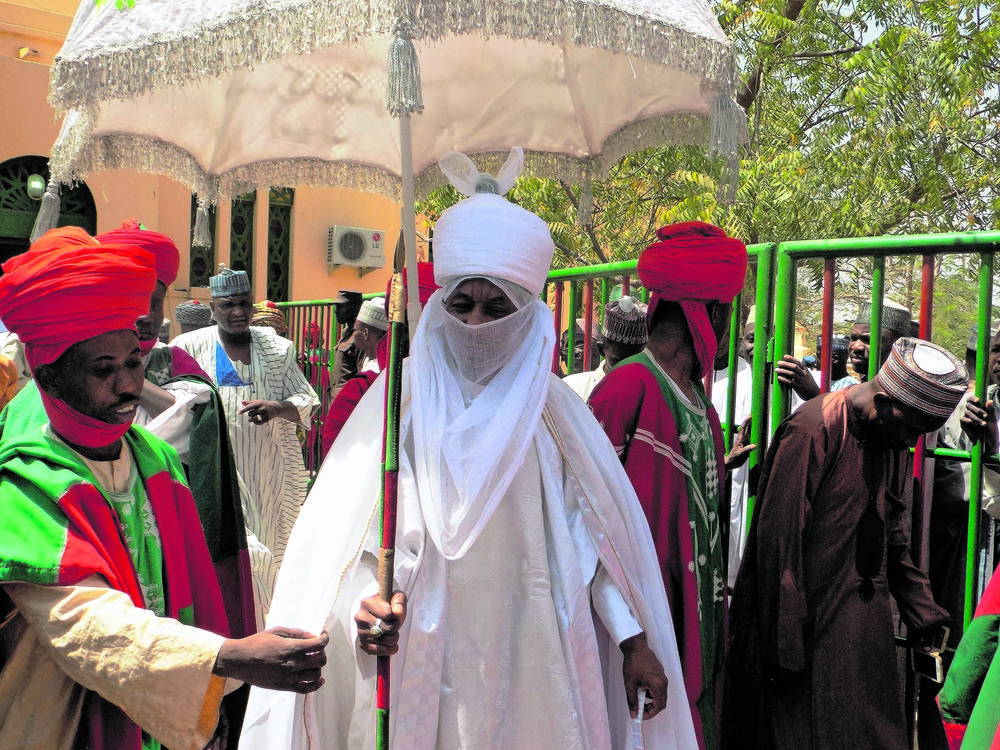
Rivalry: The recent restoration of Kano's Emir Muhammadu Sanusi II to the throne has sparked a power struggle among Nigeria's chiefs. Photo: Aminu Abubakar/AFP
noTensions are running high in northern Nigeria's largest city, Kano, as two rival royal families fight for a powerful throne that is key to controlling one of the country's most important political territories.
The royal battle, described by local media as a Nigerian version of Game of Thrones, highlights how traditional institutions are increasingly becoming instruments of political power in Africa's most populous country.
Emirs from the mostly Muslim north, along with kings, monarchs and other traditional rulers in the mostly Christian south, continue to exert widespread influence outside Nigeria's elected government.
Traditionally, the Emir of Kano is the second-highest ranking Islamic ruler among Nigerian Muslims, after the Sultan of Sokoto.
Last week, Kano State Governor Abba Kabir Yusuf restored former Emir Muhammadu Sanusi II to the throne four years after he was dethroned by the previous governor.
His successor, Aminu Ado Bayero, was removed from office along with four other emirs on Thursday after Kano State lawmakers amended the 2019 Emirates Act that established the emirate.
As the drama unfolded, Bayero returned to Kano under cover of night and declared himself the bona fide emir the next day, citing a court order staying his removal until a hearing early next month.
“We call on the authorities to ensure that justice is served in this matter. Kano is a very influential state in Nigeria. What affects Kano affects Nigeria,” he said.
As the legal battle continues, a Kano state high court has barred Bayero from calling himself emir until a hearing in June.
King Sanusi moved into the palace last Saturday and now holds court there daily, while King Bayero remains at the royal guesthouse a few kilometres away where his supporters pay their respects.
Sanusi accused political leaders of “Balkanizing” power in the emirate, creating many posts instead of one, and said his return had restored order in Kano.
“What the government and parliament have done is a rescue mission,” he said when he received his notice of reinstatement.
Both palaces are heavily guarded by the military and police.
While the city of Kano has remained relatively calm, supporters of both royal families have grown increasingly anxious and there are fears the impasse could escalate into violence ahead of the court hearing.
On Sunday, May 26, Bayero's supporters staged protests to denounce his dismissal, but critics believe the protests were sponsored by pro-Bayero politicians.
Hours later, police said they had discovered a “plot” by “thugs” to cause violence in the city and attack certain government buildings, including the state Capitol and the governor's mansion.
Provincial police chief Husseini Gumel told reporters at his office that the assailants were backed by politicians.
The royal battle between Sanusi and Bayero is also a proxy war for political dominance between former governors of the state.
Sanusi was appointed the 14th Emir of Kano State in 2014 by then Kano State Governor Rabiu Musa Kwankwaso, a member of the opposition APC party.
Sanwusi succeeded his great-uncle, Bayero's father, who died on the throne, but his troubles began when Abdullahi Umar Ganduje succeeded Kwankwaso as governor in 2015.
Ganduje, who is now the national chairman of the ruling APC, was Kwankwaso's deputy and political successor when Sanusi was appointed chieftain, but the two fell out and became political enemies.
King Sanwusi was dethroned in 2020 for “insubordination” to the state government after months of pressure from King Ganduje, including an investigation into alleged mismanagement of palace funds.
Sources familiar with the feud say Sanusi was fired because he openly criticised Ganduje's policies and supported Kwankwaso's candidacy in the 2019 elections in which Ganduje ran and was elected to a second term.
Many traditional rulers in Nigeria have no constitutional authority and are dependent on local governments for funding, but they are important cultural guardians and wield great influence in society.
Their patronage can play an important role in garnering public support for elections and government policies.
By reinstating Mr Sanwusu, the Governor has fulfilled his election promise and ensured the strengthening of his own political authority and that of the opposition NNPP party and its patron, Mr Kwankwaso.
Observers say Bayero’s counterattack is a ploy by Ganduje to counter Kwankwaso and ensure political influence for the ruling APC in Kano.
Last Saturday, the Council of Ulama, a leading group of Muslim clerics in Kano, called on President Bola Ahmed Tinubu not to take sides in the conflict and plunge the city into anarchy.
“As leader of the nation, the president should not allow the struggle for the throne to escalate into violence,” the clerics said.
“We call on the President to allow the people of Kano state to resolve these issues amicably,” the council said. — AFP

